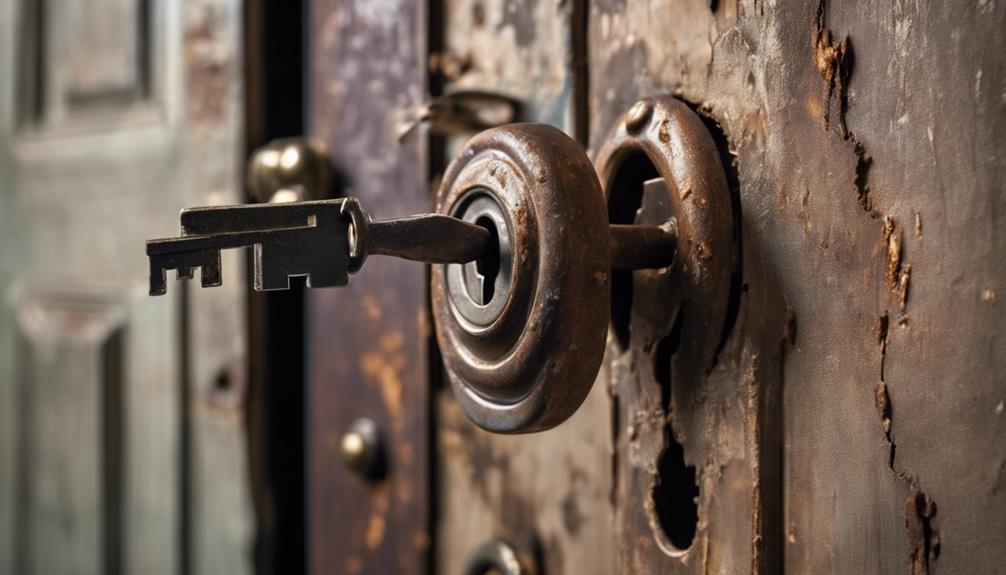Installing incompatible locks can put your home at risk in several ways. Mismatched locks may fail to secure your doors properly, making it easier for intruders to break in. You might end up with functional issues, leaving you frustrated and vulnerable. Additionally, if your insurance provider finds that your locks don't meet required standards, you could face denied claims and higher premiums. Plus, struggling with locks that don't fit can damage your doors over time. It's important to choose compatible locks to protect your property and peace of mind. Discover how to guarantee your locks are secure and reliable.
Key Takeaways
- Incompatible locks increase vulnerability to break-ins due to poor fit and functionality, creating easy access for intruders.
- Misaligned locks can lead to malfunctioning security features, resulting in gaps in protection and a false sense of security.
- Installing mismatched locks may compromise insurance coverage, potentially leading to denied claims or reduced payouts after a break-in.
- Improperly fitted locks can damage doors and frames over time, leading to costly repairs and further security risks.
- Operational difficulties from incompatible locks can cause frustration, confusion in emergencies, and hinder quick access to your home.
Understanding Lock Compatibility
When it comes to security, understanding lock compatibility is essential for ensuring your property is adequately protected. You may not realize how critical lock and door compatibility is until you face lock compatibility issues.
Choosing the right lock involves more than just aesthetics; it's about ensuring that the lock functions properly with your door and provides the best security. Factors such as the different lock replacement options can greatly affect your choice.
When selecting a lock, consider factors like the door material, thickness, and the existing hardware. A deadbolt mightn't fit correctly on a hollow core door, while a knob lock may offer inadequate security on a solid wood door.
You want to avoid the frustrations and risks that arise from incompatible locks. If a lock doesn't fit well, it can compromise your security, making it easier for intruders to gain access.
Common Types of Incompatible Locks
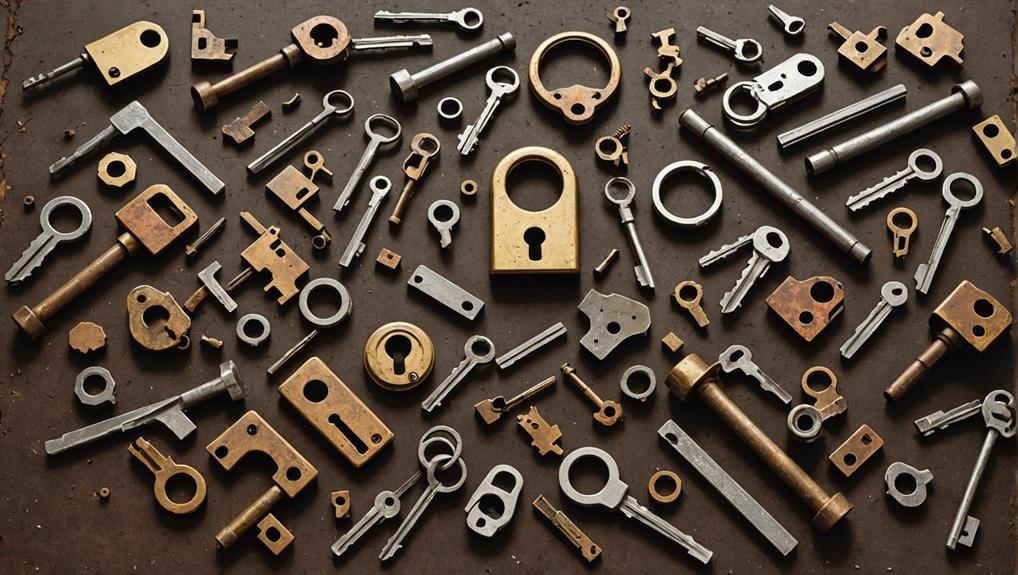
When choosing locks, you might encounter variations like deadbolts that don't fit well with your existing hardware, which can compromise your home's security.
Additionally, it's important to guarantee that the locks you select meet your specific security needs and budget, as outlined in choosing the perfect lock.
You could also face issues with electronic locks that aren't compatible with your security system.
Understanding these common types of incompatible locks is vital to keeping your home secure.
Deadbolt Variations Explained
Deadbolts come in various designs, each offering different levels of security and compatibility with other locking systems. When you're considering a lock replacement, it's vital to understand these variations to avoid the pitfalls of incompatible lock installation.
Single-cylinder deadbolts are the most common, featuring a keyhole on the outside and a thumb turn on the inside. They're easy to use but may pose a risk if there's a window nearby.
Double-cylinder deadbolts require a key on both sides, enhancing security but complicating quick exits during emergencies.
Another option is the lockable thumbturn deadbolt, providing a blend of convenience and security. However, mixing these with standard locks can create lock replacement risks if they don't match your door's design or existing hardware.
To guarantee your safety, always follow lock installation tips, like consulting a professional locksmith who can guide you through the selection process.
This way, you can better serve your needs and those of your loved ones, assuring that your home remains secure without the complications of incompatible locks.
Electronic Lock Issues
Electronic locks offer advanced security features, but they can also present compatibility issues that may compromise your home's safety. When you're considering the best locks for your door, it's crucial to verify they work seamlessly with your existing hardware and security system. Incompatible electronic locks can lead to significant lock risks, such as unauthorized access or malfunctioning systems.
One common issue arises when you try to install a smart lock that doesn't align with the specifications of your door or existing deadbolt. This mismatch can cause the lock to function improperly, leaving your home vulnerable.
Additionally, some electronic locks require specific types of door frames or power sources, which may not be compatible with your setup.
Moreover, if you're using a lock that's not widely supported, you might encounter difficulties when it comes time for repairs or replacements. Always research compatibility and consult with a professional if you're unsure.
Security Risks of Incompatible Locks
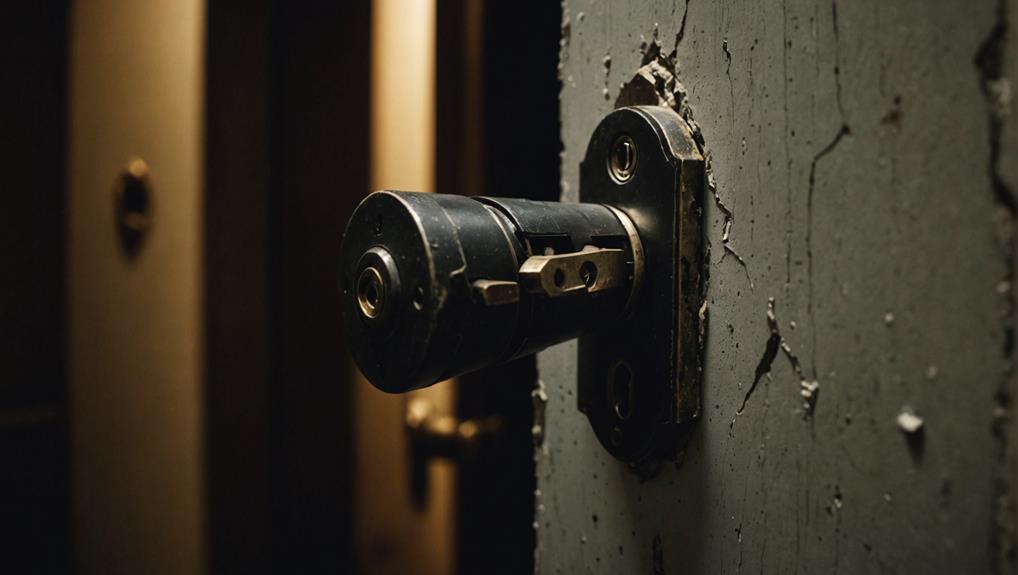
Using incompatible locks can leave your home exposed to break-ins, increasing your vulnerability greatly.
In addition, if these locks fail to meet security standards, you might also find your insurance coverage compromised when you need it most.
Understanding the importance of lock re-keying techniques can help guarantee that your locks offer the necessary protection.
Plus, malfunctioning security features can put you at even greater risk, so it's essential to confirm your locks are compatible and reliable.
Increased Vulnerability to Break-ins
In a world where security is paramount, relying on incompatible locks can greatly increase your vulnerability to break-ins.
When you install locks that don't match your doors or frames, you create weak points in your home's defenses. Thieves often look for easy targets, and incompatible locks can provide just that. If a lock doesn't fit properly or isn't designed for your specific door, it may be easier for intruders to manipulate or bypass.
Moreover, you mightn't even realize how these mismatched locks compromise your security. A lock that seems functional could have hidden flaws, making it less reliable than you think.
When you prioritize aesthetics or cost over compatibility, you might inadvertently set the stage for a break-in.
Compromised Insurance Coverage
When you choose incompatible locks for your home, you might unknowingly jeopardize your insurance coverage. Insurance companies often require that your home has a certain level of security. If your locks don't meet those standards, you could find yourself facing denied claims or reduced payouts in the event of a break-in.
Think about it: your insurance policy is designed to protect you and your loved ones. However, if you've installed locks that aren't compatible with your security system, you're fundamentally putting that protection at risk.
The safety of your family and the security of your possessions depend on reliable locks that work seamlessly with your existing systems.
Before making any decisions, it's crucial to consult your insurance provider. They can inform you about specific requirements for your coverage and what types of locks are considered acceptable.
By ensuring your locks are compatible, you're not just safeguarding your home but also investing in peace of mind. Remember, serving others begins with taking the right steps to protect what matters most—your family and your home.
Don't let incompatible locks become an obstacle to your security and support.
Malfunctioning Security Features
Installing incompatible locks can lead to malfunctioning security features that leave your home vulnerable. When you choose a lock that isn't designed for your door or security system, you risk creating gaps in protection.
Think about it: a lock that doesn't fit properly mightn't engage fully, making it easier for intruders to bypass. You want to guarantee that your loved ones and belongings are safe.
If you're using incompatible locks, you could inadvertently compromise your entire security setup. For instance, electronic locks mightn't sync with your home automation system, disabling alerts or remote access when you need them most.
This can create a false sense of security, and you mightn't realize there's a problem until it's too late. Moreover, incompatible locks can wear down more quickly, increasing the likelihood of a malfunction.
Regularly check your locks to guarantee they function as intended. Choosing the right locks isn't just about convenience; it's about protecting those you care about.
Functional Issues With Mismatched Locks
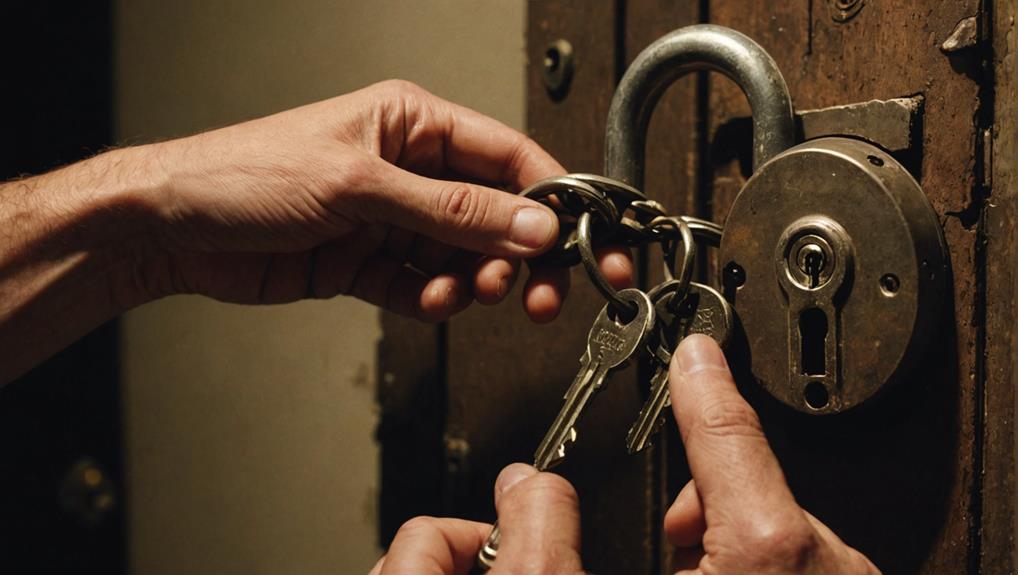
Mismatched locks can lead to significant functional issues that compromise security and convenience. When you install locks that don't work well together, you may find yourself struggling to operate them smoothly. This can create frustration not just for you, but also for anyone you serve, whether they're family, friends, or clients.
Imagine the inconvenience of fumbling with a key that doesn't fit properly or a lock that sticks when you need to enter or exit quickly. Additionally, worn or damaged locks can serve as a warning sign that replacement is necessary, as they can exacerbate the problems caused by mismatched systems signs your lock needs replacing.
Furthermore, mismatched locks can cause confusion in emergency situations. If you need to help someone in distress, the last thing you want is to waste precious time figuring out a faulty lock. These functional issues can also lead to a false sense of security, making you vulnerable to break-ins or unauthorized access.
It's essential to prioritize compatibility when choosing locks. By confirming that all locks match regarding brand and function, you'll enhance both security and ease of use.
Serving others means creating a safe and convenient environment for everyone involved. So, take the time to select the right locks, and you'll guarantee peace of mind for yourself and those you care about.
Potential Damage to Doors and Frames
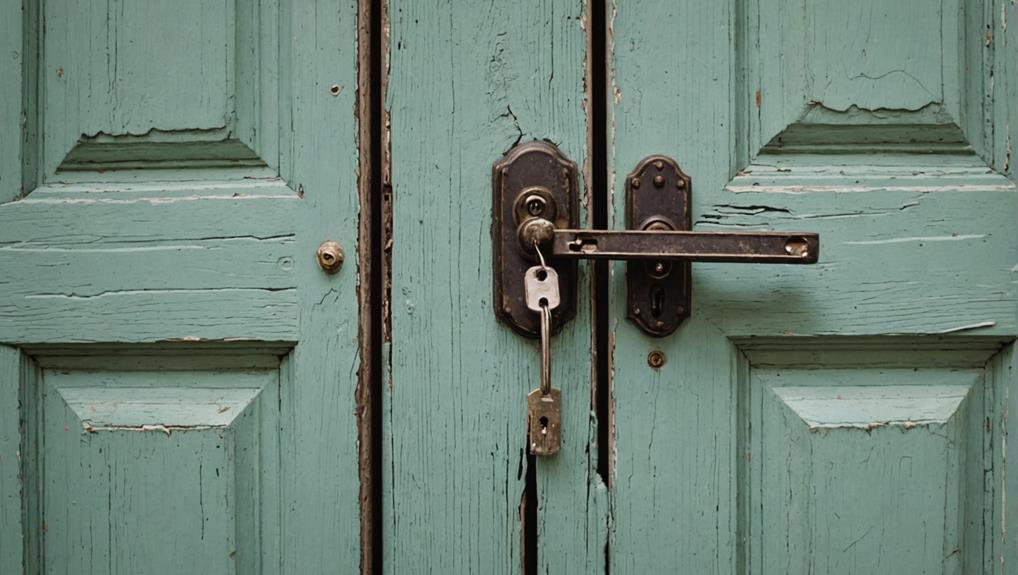
Incompatible locks can lead to more than just functional frustrations; they can also cause serious damage to your doors and frames. When you install a lock that doesn't fit properly, it can strain the door and its components. This is why it's essential to use the correct tools for lock replacement, as improper tools can exacerbate the issue and lead to further complications using the correct tools.
Over time, this strain may result in warping or cracking, making the door less secure and compromising its integrity.
You mightn't realize it, but improperly fitted locks can create gaps between the door and frame. This not only affects the aesthetic appeal but also allows drafts, moisture, and pests to enter your home. If you're serving others by guaranteeing their safety, maintaining the quality of your doors is essential.
Additionally, the installation process itself can create issues. If you're forced to drill new holes or modify the frame to accommodate an incompatible lock, you risk damaging the material.
Taking the time to choose the right lock for your door can save you from costly repairs down the line. Ultimately, investing in compatible locks protects the doors you cherish and guarantees a safe environment for everyone in your care.
Prioritizing quality and compatibility makes a significant difference in maintaining your home.
Increased Insurance Liability
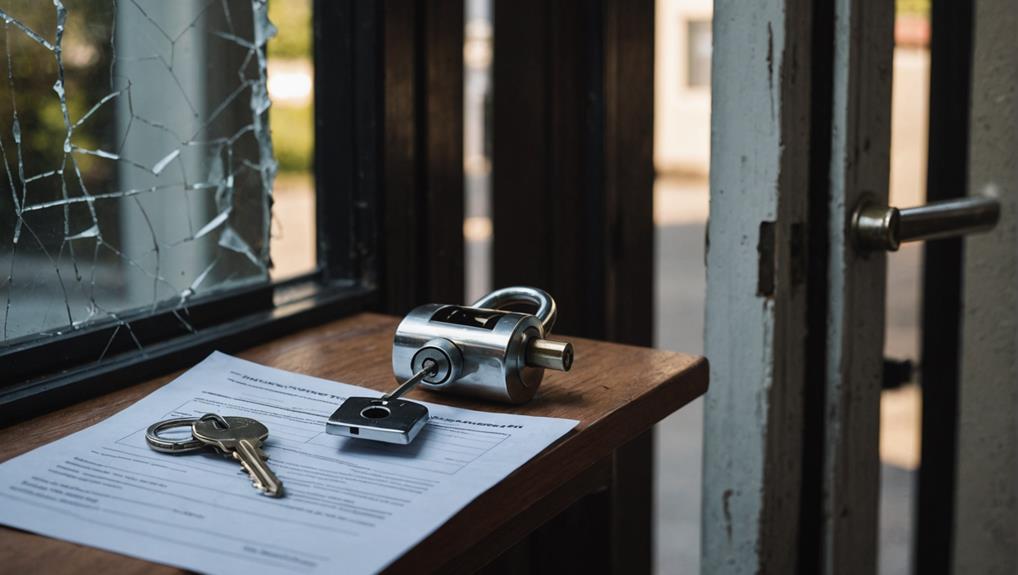
Using the wrong locks can greatly increase your insurance liability. When you opt for incompatible locks, you may unknowingly expose yourself to higher risks, which can lead to significant financial repercussions.
Insurers often require specific lock types for coverage, and failing to comply could mean denied claims when you need help the most. To guarantee compliance, it's crucial to evaluate essential tips for choosing insurance-compliant locks that meet your insurer's requirements.
Evaluate the following potential risks:
- Increased Vulnerability: Incompatible locks may not provide adequate security, making your property more susceptible to break-ins.
- Policy Violations: Many insurance policies have clauses that require certain security measures. Incompatible locks could violate these terms.
- Higher Premiums: If your insurer recognizes your use of unsuitable locks, they may increase your premiums.
- Loss of Coverage: In severe cases, insurers might even cancel your policy if they find you're using incompatible security devices.
- Claims Denial: If a break-in occurs, your insurer may deny your claim, leaving you to shoulder the financial burden alone.
Tips for Ensuring Lock Compatibility
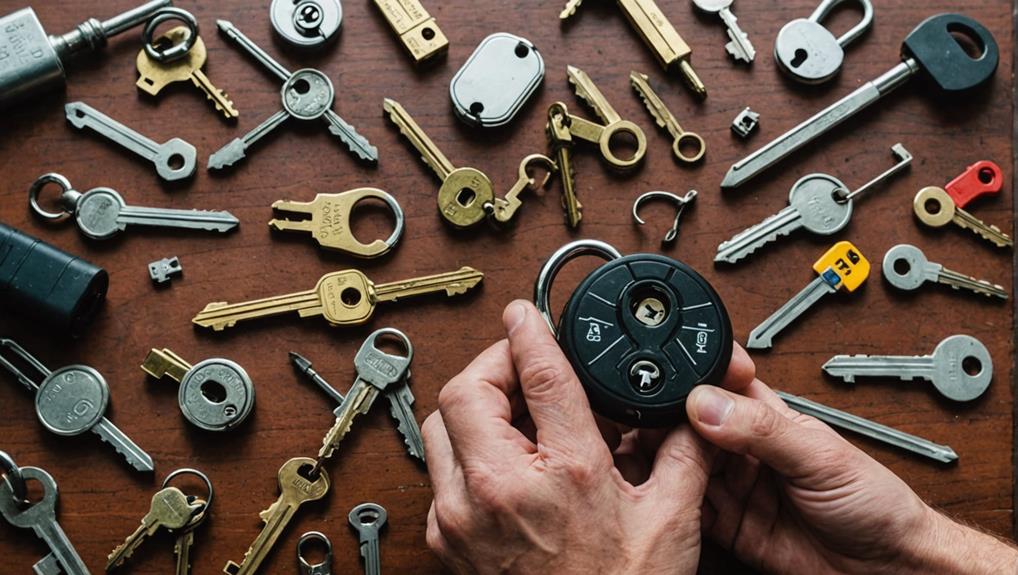
When choosing locks for your property, it's vital to verify they meet compatibility standards to protect your security and insurance coverage. One important aspect of lock replacement is understanding how it can greatly enhance your overall business security.
Essential lock replacement not only safeguards your assets but also guarantees that your insurance remains valid in case of a breach. Start by understanding the specific requirements of your doors, including their size and type. Measure the existing locks and confirm any new ones match these dimensions precisely.
Next, consider the lock's intended purpose. Different areas of your property may require different levels of security. For instance, exterior doors often need deadbolts for added protection, whereas interior doors might only need standard knob locks.
It's also wise to check the brand and model of your existing locks. Some manufacturers design their products to work together seamlessly, so sticking with the same brand can often simplify compatibility.
Additionally, don't hesitate to consult product specifications or user manuals. They often provide valuable insights into compatibility.
Lastly, read customer reviews and forums to learn about others' experiences with specific locks. This can help you avoid potential pitfalls and guarantee you choose a reliable option that serves your property well.
Seeking Professional Installation Services
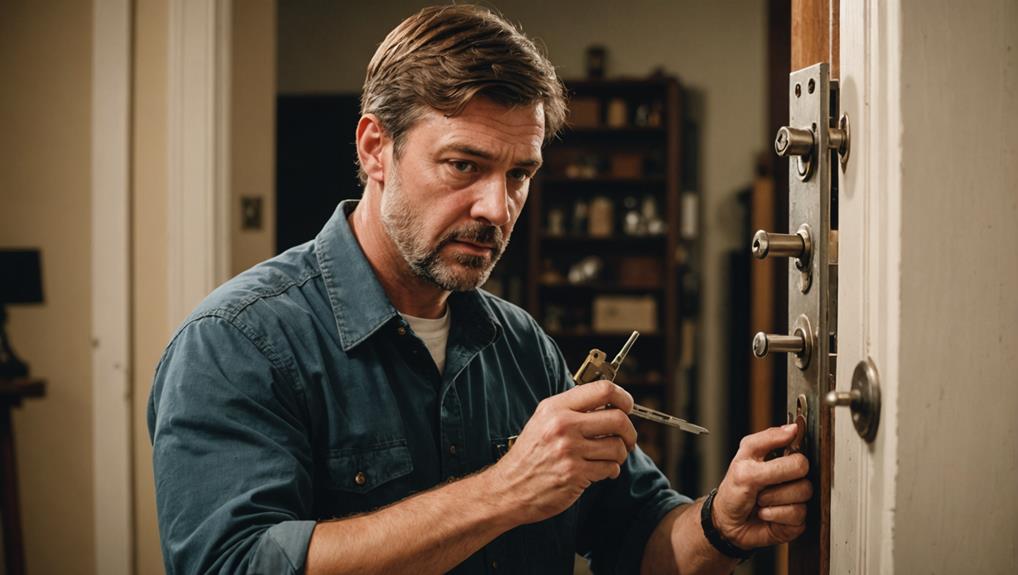
Choosing professional installation services for your locks is vital to ensuring ideal security and functionality. When you hire experts, you're not just getting a service; you're investing in peace of mind for yourself and those you care about.
Improper installation can lead to issues that not only compromise your security but may also void your lock's warranty, leaving you with additional costs down the line.
How improper installation impacts warranties is important to reflect on. Here's why seeking professionals is the way to go:
- Expert Knowledge: Professionals understand the nuances of different lock types and compatibility.
- Proper Tools: They come equipped with the right tools to handle any installation challenge.
- Time Efficiency: Experienced installers work quickly, minimizing disruption to your daily routine.
- Warranty Benefits: Many professional services offer warranties, protecting your investment and providing future support.
- Safety Assurance: Proper installation reduces the risk of lock failure, keeping your home secure.
Frequently Asked Questions
Can I Mix Different Brands of Locks on My Doors?
You can mix different brands of locks on your doors, but it's important to take into account compatibility.
Different brands may have varying key designs, security features, and installation requirements. This could lead to confusion or even security vulnerabilities.
If you're serving others, assure you're providing reliable access and security.
It's often best to stick to one brand for consistency and peace of mind, assuring everyone can easily use the locks without issues.
Are Smart Locks Compatible With Traditional Lock Systems?
Smart locks can often be compatible with traditional lock systems, but it depends on the specific models.
You'll want to check the manufacturer's specifications to guarantee they can work together. If you're considering upgrading, you might find smart locks that can replace your existing ones or adapters that help them function together.
Just make certain you're aware of any potential limitations before making a decision, so you can best serve your needs.
What Is the Cost Difference Between Compatible and Incompatible Locks?
Did you know that nearly 30% of homeowners face unexpected costs due to incompatible locks?
When you compare compatible locks to their incompatible counterparts, you'll find that compatible options usually range from $100 to $300, while incompatible ones can lead to expenses exceeding $500, factoring in installation and replacements.
Choosing compatible locks not only saves you money but also guarantees peace of mind, helping you serve your loved ones better in securing their safety.
How Often Should I Replace My Locks for Maximum Security?
You should replace your locks every 3 to 5 years to maintain maximum security.
However, if you've experienced a break-in, lost your keys, or noticed wear and tear, you should act sooner.
Regularly check your locks for functionality and confirm they meet current security standards.
Upgrading to more secure options can also enhance your safety.
Can I Use Incompatible Locks Temporarily Until Replacements Arrive?
You can use incompatible locks temporarily, but it's not ideal.
They mightn't fit properly or offer the security you need. If you're in a bind, make sure you're aware of any potential risks.
While waiting for replacements, keep your home secure in other ways—like reinforcing doors or using an alarm system.
Conclusion
So, while you might think installing a flashy new lock will make your home more secure, the irony is that it could actually compromise your safety. Incompatible locks can lead to security breaches, functional headaches, and even damage to your doors. Instead of saving time and money, you might end up with a costly mess. To keep your home safe and sound, it's best to stick with compatible locks and maybe call in a pro to do the job right.

